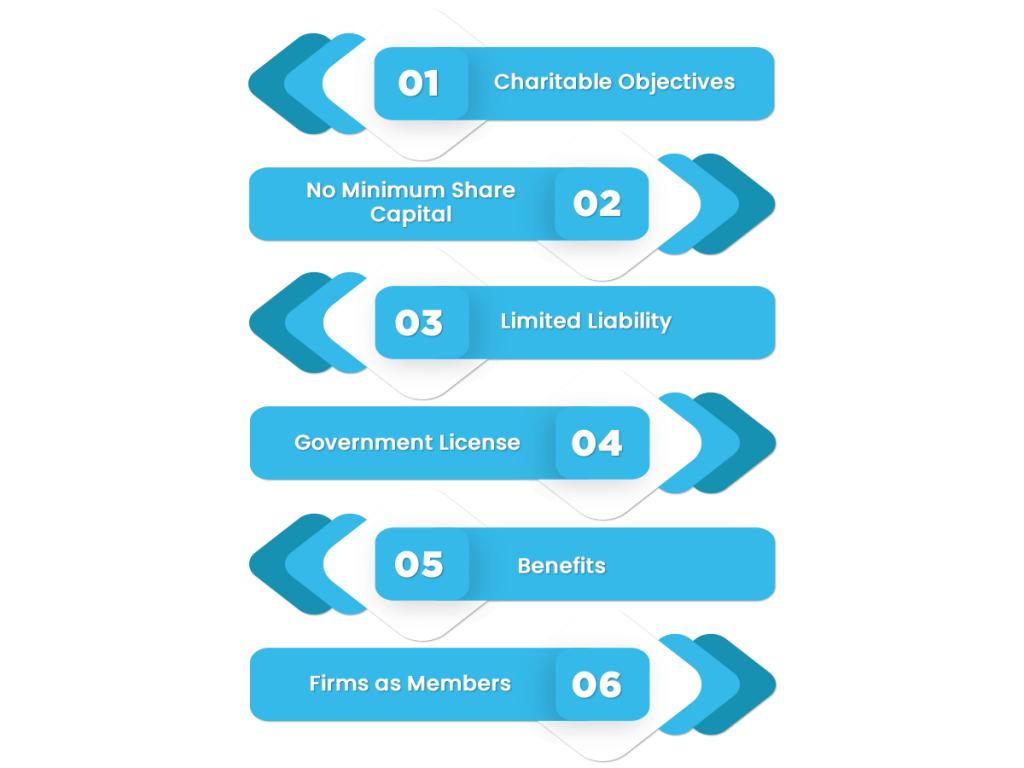Tabular Guide on Section 8 Company Annual Compliance

Shivani Jain | Updated: Jul 15, 2020 | Category: Compliance, Section 8 Company
A Non-Governmental Organization formed to encourage art, research, education, etc. is known as Section 8 Company. The profits earned by this business format are invested back to promote the activities of the company. However, like every corporate entity, this company also needs to file Annual Returns on the MCA Portal. In today’s blog, we will talk about the Tabular Guide on section 8 company Annual Compliance.
Table of Contents
Concept of Section 8 Company
The concept of section 8 company differs from private or public limited companies. Further, the definition of section 8 company is given under Section 8 (1) of the Companies Act, 2013[1] . As per this, a company formed as an NGO to promote non-profitable activities is a section 8 company.
The term “non-profitable activities” include commerce, art, music, science, education, social welfare, etc. This business format restricts the distribution of dividends to the members.
Like any other company, this business format also needs to file its financial statements and other compliance on time. All the annual compliance for section 8 companies must be filed on the Ministry of Corporate Affairs (MCA) portal.
Features of Section 8 Company

In India, the features of a section 8 company are as follows:
- Charitable Objectives: A section 8 company aims to achieve charitable objectives. That means this business structure does not work to earn profits.
- No Minimum Share Capital: There is no minimum paid-up share capital requirement for this company.
- Limited Liability: The members of a section 8 company enjoy the feature of limited liability. That means their liability is limited to the number of shares held by them.
- Government License: This Company needs to acquire government approval prior to commencing its operations.
- Benefits: The Companies Act 2013 provides several benefits and exemptions to these companies.
- Firms as Members: Besides individuals and AOP (Association of Person), firms can also become a member of a Section 8 Company.
Benefits of Section 8 Company Compliance

The benefits of Section 8 Company Annual Compliance are as follows:
- Betters Goodwill of the Companies;
- Protects from Legal Trouble;
- Build Trust among the Customers;
- Avoid Penalties.
Mandatory Section 8 Company Annual Compliance
| S. No. | Particulars | Section and Rules | Particular of Section 8 Company Annual Compliance |
| 1. | Form MBP-1 | Section 184 (1) | A Director needs to disclose his interest in the first board meeting of the company in each financial year. Further, every director needs to submit a fresh MBP- 1 whenever there is a change in his interest. |
| 2. | Form DIR- 8 | Section 164 (2) and 143 (3) (g) | Every Director needs to file his/her disclosure for non-disqualification in each financial. |
| 3. | Annual Form MGT- 7 | Section 92 | Every company needs to file its Annual Return within sixty days from the date of the Annual General Meeting. The time period for filing the Annual Return will be for the period 1st April to 31st March. |
| 4. | Annual Form MGT- 8 | Section 92 | A company with a paid-up share capital of Rs 10 Crore or an annual turnover of Rs 50 crore needs to be certified by a Practising Company Secretary. |
| 5. | Annual Form AOC- 4 | Section 137 | A company needs to file its Balance Sheet and Financial Statements within 30 days of the date of AGM. The term “Financial Statement” includes Cash Flow Statement, Profit and Loss Account, Auditors Report, and Directors Report. |
| 6. | Annual Form DPT- 3 | Section 73 Rule 16 | A company needs to file this form every year on or before the 30th of June. This form regards the Return of Deposit and Particulars not considered as Deposit as on 31st March. |
| 7. | Event Based Form BEN- 2 | Section 90 | A company needs to file BEN- 2 within thirty days of the receipt of BEN- 1 from the Shareholder. Further, a company needs to check for the significant beneficial owner regularly. |
| 8. | Annual Form DIR -3 KYC (Know Your Customer) | Rule 12 A | All the Directors need to file this form on or before the 30tho f September of every financial year. |
| 9. | Half Yearly Return MSME- 1 | Section 405 | The directors of the company need to file this form in every half year. This form deals with outstanding payments to the MSME vendors. Further, the due date for filing in each half-year is as follows: a) April to September: 30th October b) October to March: 30th April |
| 10. | Directors Report | Section 134 | All the information relevant to section 134 shall be included in AOC – 4 as Directors Report. Further, the chairman needs to sign the board report; however, if the chairman is not present, at least two directors shall sign the same. Out of which one should be the Managing Director. |
| 11. | Circulation of Financial Statements and other relevant Documents | Section 136 | The company will send the approved Financial Statement, Directors Report, and Auditors Report to all the members. Such documents need to be sent at least 14 days prior to the Annual General Meeting. Further, if the AGM is called on a shorter notice, then the above documents shall be circulated on such a shorter duration. However, a company needs to obtain prior approvals for holding an AGM at shorter notice. |
| 12. | Notice of AGM | Section 101 and Secretarial Standard II | The directors of the company need to prepare every notice of AGM as per Section 101. |
| 13. | Sending of Notice of AGM | Section 101 and Secretarial Standard | The notice for the AGM will be sent to all the Directors, Auditors, Members, and Debenture Trustees. |
| 14. | Board Meetings | Section 173 and Secretarial Standard I | Every company needs to hold a minimum number of two board meetings every year. That means at least one meeting shall be held in each half year. |
| 15. | Maintenance of Statutory Registers | Section 88 and other relevant sections | A company needs to maintain the following mandatory Registers: Register of Director; Registers of Director Shareholding; Registers of Members; Registers of Transfers Registers of Related Party Transaction. |
| 16. | Appointment of Auditor E-Form ADT – 1 | Section 139 | A company needs to appoint an auditor for a period of five years. After 15 days of appointment, the directors need to file form ADT- 1. |
Event Based Section 8 Company Annual Compliance
The event-based section 8 company annual compliance can be summarised as:
| S.no | Event-Based Annual Compliance |
| 1. | Appointment, Reappointment or Removal of Directors; |
| 2. | Appointment, Reappointment or Removal of Auditors; |
| 3. | Appointment of the Key Managerial Personnel (KMP); |
| 4. | Transfer of Shares; |
| 5. | Change in the Name of the Company; |
| 6. | Any amendment in the MOA (Memorandum of Association). |
| 7. | Change of the Registered Address of the Company; |
| 8. | Any other changes as prescribed in the policy of the company. |
Due Dates for Filing Section 8 Company Annual Compliance
| Form No | Section 8 Company Annual Compliance | Due Date for filing Section 8 Company Annual Compliance |
| MGT-15 | AGM (Annual General Meeting) | 30th September of every financial year; |
| AOC- 4 | Directors Report | Within 30 days from the date of the Annual General Meeting; |
| MGT-7 | Annual Returns | Within 60 days from the date of the Annual General Meeting; |
| Form ITR -6 | To File Income Tax Returns | 30th September every financial year; |
Penalty for Non-Compliance
The Ministry of Corporate Affairs has prescribed certain punishments for not filing compliance for section 8 company, which are as follows:
- If a company is working dishonestly, the Central Government has the power to revoke the license granted;
- If the company is working against the objectives prescribed, the CG can revoke the license;
- In case of default, the company will be liable to pay Rs 10 lakhs to Rs 01 crore as a penalty;
- Further, every director and officer in default will be either liable to pay Rs 25 lakhs or punishable with imprisonment or both;
- If in case the company is acting fraudulently, then each officer will be held liable under section 447.
Conclusion
A section 8 company enjoys several benefits and tax exemptions over other types of NGOs. It is always advisable to apply for section 8 company registration rather than society or trust.
Further, section 8 company needs to maintain its books of accounts in the prescribed form. Also, it requires to timely satisfy all the compliances to avoid penalties imposed by the Central Government.
Reach out to Swarit Advisors to obtain a Section 8 Company Registration in a hassle-free and straightforward manner. Further, our experts will also provide you end-to-end assistance in section 8 company annual compliance.














